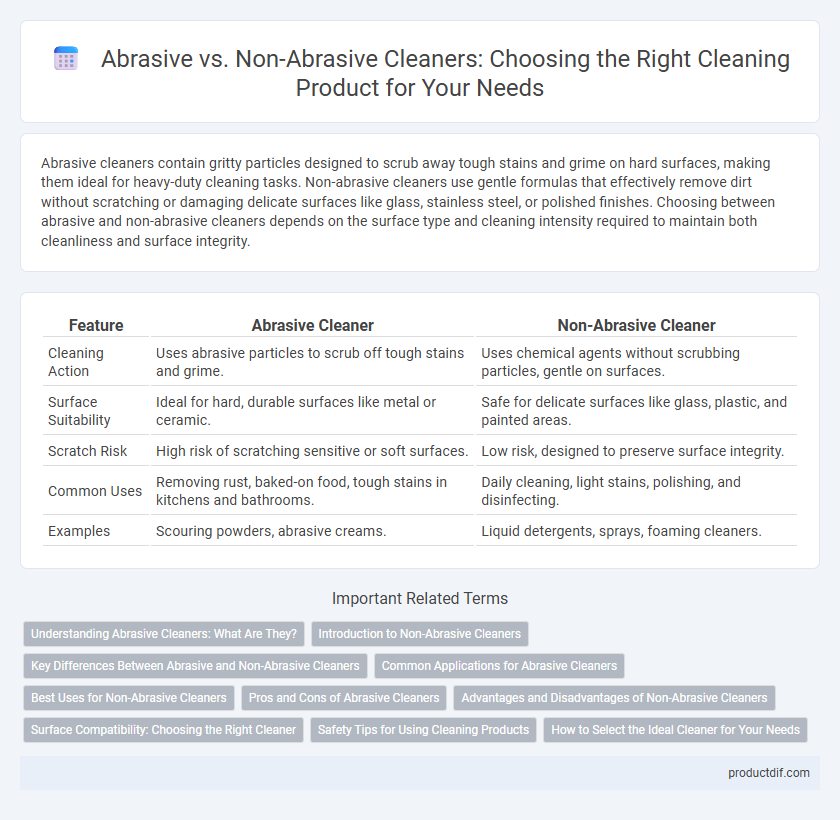Abrasive cleaners contain gritty particles designed to scrub away tough stains and grime on hard surfaces, making them ideal for heavy-duty cleaning tasks. Non-abrasive cleaners use gentle formulas that effectively remove dirt without scratching or damaging delicate surfaces like glass, stainless steel, or polished finishes. Choosing between abrasive and non-abrasive cleaners depends on the surface type and cleaning intensity required to maintain both cleanliness and surface integrity.
Table of Comparison
| Feature | Abrasive Cleaner | Non-Abrasive Cleaner |
|---|---|---|
| Cleaning Action | Uses abrasive particles to scrub off tough stains and grime. | Uses chemical agents without scrubbing particles, gentle on surfaces. |
| Surface Suitability | Ideal for hard, durable surfaces like metal or ceramic. | Safe for delicate surfaces like glass, plastic, and painted areas. |
| Scratch Risk | High risk of scratching sensitive or soft surfaces. | Low risk, designed to preserve surface integrity. |
| Common Uses | Removing rust, baked-on food, tough stains in kitchens and bathrooms. | Daily cleaning, light stains, polishing, and disinfecting. |
| Examples | Scouring powders, abrasive creams. | Liquid detergents, sprays, foaming cleaners. |
Understanding Abrasive Cleaners: What Are They?
Abrasive cleaners contain gritty particles designed to scrub away tough stains, grime, and buildup from hard surfaces like countertops, sinks, and cookware. These particles create friction that physically removes dirt but may cause scratches on delicate materials such as glass or polished finishes. Understanding the composition and intended surface use of abrasive cleaners is essential to prevent damage while achieving effective cleaning results.
Introduction to Non-Abrasive Cleaners
Non-abrasive cleaners are formulated to effectively remove dirt, grime, and stains without scratching or damaging surfaces, making them ideal for delicate materials such as glass, stainless steel, and painted finishes. These cleaners often contain gentle surfactants, enzymes, or mild solvents that break down residues while preserving the integrity and appearance of the surfaces. Their chemical composition ensures safety and versatility, allowing use on a wide range of household items including countertops, appliances, and ceramics without the risk of abrasion.
Key Differences Between Abrasive and Non-Abrasive Cleaners
Abrasive cleaners contain gritty particles that physically scrub surfaces to remove tough stains and grime, making them ideal for durable materials like stainless steel and ceramic. Non-abrasive cleaners use chemical agents without harsh scrubbing particles, protecting delicate surfaces such as glass, plastic, and painted finishes from scratches. Understanding the key differences helps select the right cleaner to maintain surface integrity while effectively eliminating dirt and buildup.
Common Applications for Abrasive Cleaners
Abrasive cleaners are commonly used for removing tough stains, rust, and grime from hard surfaces such as metal cookware, ceramic tiles, and concrete floors. They are effective in scrubbing away burnt-on food residues and lime scale, often utilized in kitchens, garages, and industrial settings. These cleaners provide a strong mechanical action that helps restore surfaces without causing significant damage when used correctly.
Best Uses for Non-Abrasive Cleaners
Non-abrasive cleaners are best used for delicate surfaces such as glass, stainless steel, and painted finishes where maintaining surface integrity is essential. They effectively remove dirt, grime, and grease without causing scratches or damage, making them ideal for everyday cleaning of countertops, appliances, and bathroom fixtures. These cleaners often contain mild detergents and gentle solvents that provide safe, thorough cleaning while preserving the material's finish.
Pros and Cons of Abrasive Cleaners
Abrasive cleaners excel in removing tough stains and grime due to their gritty texture, making them ideal for heavy-duty cleaning tasks on hard surfaces like metal, ceramic, and glass. However, their abrasive nature can cause scratches, dull finishes, and surface damage, limiting their use on delicate materials such as polished wood, stainless steel, and non-stick coatings. While effective for deep cleaning, abrasive cleaners require careful application to avoid permanent damage and may not be suitable for all household surfaces.
Advantages and Disadvantages of Non-Abrasive Cleaners
Non-abrasive cleaners offer the advantage of being gentle on surfaces, preventing scratches and preserving finishes on delicate materials such as glass, ceramic, and polished metals. They are ideal for cleaning sensitive areas without causing damage, making them suitable for use on electronics and sealed countertops. However, their milder formulation may be less effective at removing tough stains or baked-on grime compared to abrasive cleaners.
Surface Compatibility: Choosing the Right Cleaner
Abrasive cleaners contain rough particles that effectively remove tough stains and grime but can scratch or damage delicate surfaces such as glass, polished metals, or coated finishes. Non-abrasive cleaners use gentle chemical agents that safely clean without scratching, making them ideal for sensitive surfaces like ceramic, fiberglass, and painted surfaces. Selecting the right cleaner based on surface compatibility prevents damage and ensures optimal cleaning results.
Safety Tips for Using Cleaning Products
Abrasive cleaners contain gritty particles that effectively remove tough stains but can scratch delicate surfaces and irritate skin, so wearing gloves and testing on a small area is crucial. Non-abrasive cleaners are gentler and safer for sensitive surfaces but may require longer contact time to clean thoroughly, making ventilation and following label instructions essential. Always store cleaning products out of reach of children and avoid mixing different products to prevent hazardous chemical reactions.
How to Select the Ideal Cleaner for Your Needs
Choosing between abrasive and non-abrasive cleaners depends on the surface type and cleaning task; abrasive cleaners contain exfoliating agents suitable for tough stains on durable surfaces like ceramics and metals, while non-abrasive cleaners use gentle formulas ideal for delicate materials such as glass, painted surfaces, and plastics. Assess surface sensitivity, cleaning strength required, and potential for scratching or damage before selecting a product. Always review product labels, ingredients like silica or calcium carbonate for abrasives, and ensure compatibility with the specific material to maintain longevity and appearance.
Abrasive cleaner vs Non-abrasive cleaner Infographic

 productdif.com
productdif.com